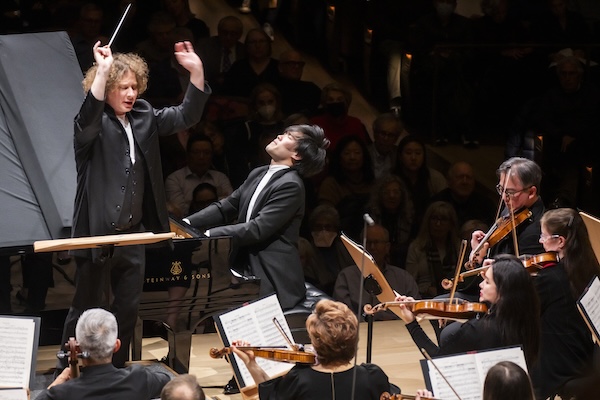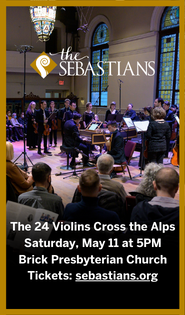Liu’s fresh-look Rachmaninoff highlights a mixed Philharmonic program

The poet got it wrong: February is the cruelest month.
The shorter calendar has one anticipating the end of winter, but the still-limited sunshine and bad weather dash one hope after another. Torpor is the general feeling, and it hung over David Geffen Hall Thursday night where the New York Philharmonic hit the nice round number of 17,000 concerts with a staid program: Louise Farrenc’s Overture No. 2, the Rhapsody on Themes of Paganini by Rachmaninoff (with piano soloist Bruce Liu), and Dvořák’s Symphony No. 7.
Not that one expects profundity and fireworks for every subscription concert, but guest conductor Santtu-Matias Rouvali’s intentions appeared to lack all ambition. That was the signal with programming Farrenc’s overture. Perhaps there is a case to be made that she is a notable composer neglected during the 19th century because of her gender, but the overture is not the piece to make it. The music is explicitly derivative of Beethoven’s Leonore overtures, with a dash of Berlioz, and has no discernible individual voice or style. Despite skillful playing from the orchestra, it came off as a meaningless ten minutes.
The shame of that was there was a packed crowd on hand for Liu. And the Rhapsody performance was both the highpoint of the concert and significant in itself.
Liu, who won first prize at the 2018 Chopin Competition, had a refreshing and attractive take on the piece in this Philharmonic debut. His agile technique and light, bright touch emphasized the wit in many of Rachmaninoff’s variations and kept sentimentality at bay. He was backed in this by conductor and orchestra, who were precise and managed the same light touch, with the exception of some clams and surprisingly poor intonation in the trumpets.
The result was the fun, not the weepy, side of Rachmaninoff. The introduction had a stimulating, cheeky quality to it, and though both Liu and the orchestra played the more lyrical passages with suavity, there was nothing mannered nor indulgent, and even the lushness of the middle sections came off with the wry distance of a Frank Sinatra/Nelson Riddle album.
This was rewarded with rapturous applause, and Liu returned this with two encores, an equally agile, balanced, and very quick “La Campanella,” (No. 3 of Liszt’s Transcendental Etudes after Paganini) and then Alexander Siloti’s transcription of Bach’s Prelude in E minor, which had the fascinating quality of a Rachmaninoff-esque lushness under Liu’s hands.
The orchestra played Dvořák’s symphony after intermission. A solid work, the right interpretation can bring out great depths in the music. But that didn’t happen. In fact, much of the performance drifted around both technically and artistically. There was no drama at the opening, and even some awkwardness in connecting the first phrases to each other.
That pointed to a consistent feeling in the first two movements that Rouvali was taking it tactically, step by step, without any clear view of the larger form. The notes came consecutively but without the sense that there was a specific distant goal.
Dvořák wrote a scintillating waltz for the scherzo, and perhaps the sheer quality and force of the music pushed the playing into a clear direction. That movement was a big improvement on the previous two, and the finale came through as a coherent whole, but this wasn’t enough to feel the entire performance a success. Like February, there was some hope this evening, and also plenty of disappointment.
This program will be repeated 8 p.m. Saturday. nyphil.org







